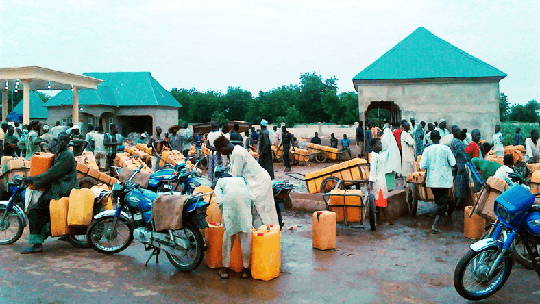UNICEF has expressed concern over the shortage of potable water in Nigeria, saying over 86 per cent of Nigerians lack access to a safely managed drinking water source. UNICEF in a statement to commemorate World Water Day, further noted that “although about 70 per cent of Nigerians are reported to have access to basic water services, more than half of these water sources are contaminated.”
UNICEF Representative in Nigeria, Peter Hawks, said in a statement that though 73 per cent of the country’s population had access to a water source, only nine litres of water on average was available to a Nigerian daily. The statement read:
“At the current rate, the country will miss the SDG targets on people’s access to water, unless there is a strong commitment and appropriate action taken by all stakeholders. “While the impact of water scarcity can be felt by all, no one suffers more than the most vulnerable children.
‘’Children and families living in vulnerable communities face the double-edged sword of coping with high water scarcity levels while having the lowest water services, making access to sufficient water especially susceptible to climate shocks and extreme events. “We have to act now both to address the water crisis in Nigeria to prevent it from getting worse and if we want to meet the SDGs.
“We can only achieve water security for every Nigerian – including the Nigerian child – through innovation, investment, and collaboration, and by ensuring services are sustainable and well-managed. We must act – for the sake of our children and our planet.”
UNICEF further noted that according to its latest analysis, globally, more than 1.42 billion people, including 450 million children, were living in areas of high or extremely high water vulnerability. UNICEF stated: “This means that 1 in 5 children worldwide does not have enough water to meet their everyday needs.
“The figures in Nigeria are particularly worrying, with 26.5 million Nigerian children experiencing high or extremely high water vulnerability – or 29 percent of Nigerian children.
“The analysis, part of the Water Security for All initiative, identifies areas where physical water scarcity risks overlap with poor water service levels. Communities living in these areas depend on surface water, unimproved sources of water, or water that can take more than 30 minutes to collect.
“The world’s water crisis is not coming – it is here, and children are its biggest victims. When wells dry up, children are the ones missing school to fetch water. When droughts diminish food supplies, children suffer from malnutrition and stunting.”
‘’When floods hit, children fall ill from waterborne illnesses. And when water is not available in Nigerian communities, children cannot wash their hands to fight off diseases. “Children in 37 ‘hotspot’ countries face especially dire circumstances, in terms of absolute numbers, the proportions of children affected, and where global resources, support, and urgent action must be mobilised.
‘’This list includes Afghanistan, Burkina Faso, Ethiopia, Haiti, Kenya, Niger, Nigeria, Pakistan, Papua New Guinea, Sudan, Tanzania, and Yemen.’’
Source: Vanguard News Nigeria
